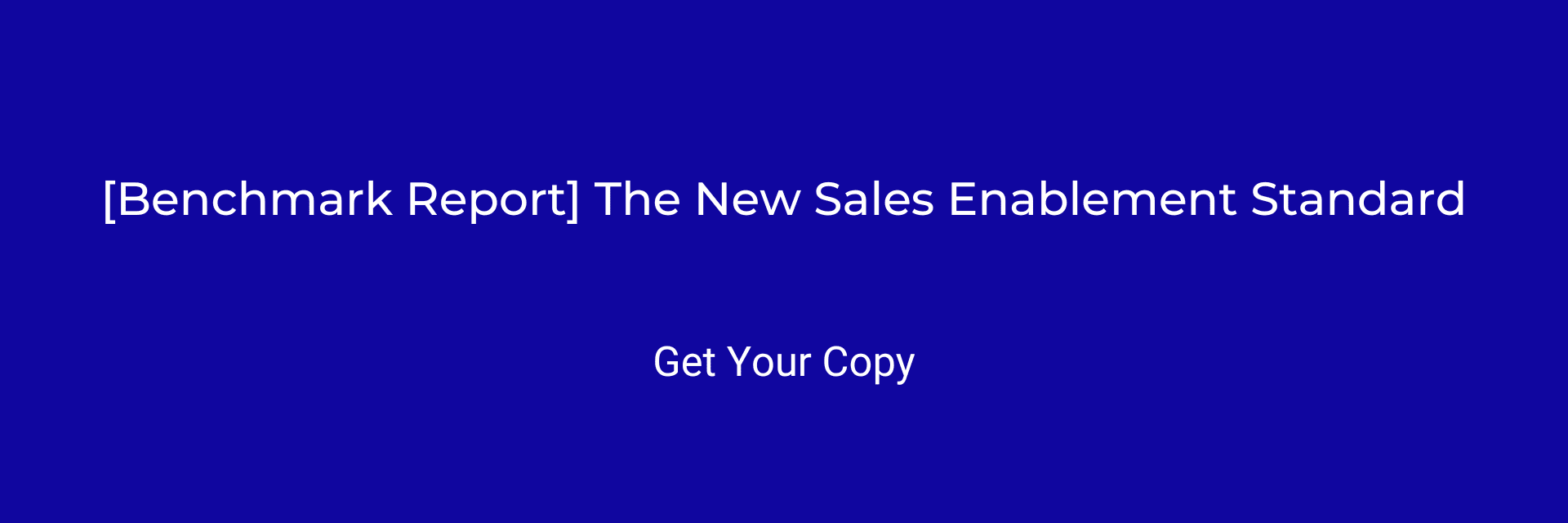Is It Time To Hire a Sales Enablement Manager?
There are many factors that affect sales target achievement. Unfortunately, many of those are beyond your circle of control such as competitor pricing, state of economy etc. The good news is that predictable sales can be accomplished in any environment by adopting a disciplined approach to sales management.
Most sales organizations do a pretty good job of managing the well-known levers of sales management such as hiring the right talent, actively managing the pipeline and CRM reports, and optimizing OTEs and incentive structures. However, the number of organizations that leverage sales enablement the right way is shockingly low. Mindtickle’s survey of more than 40 tech startups with more than $10M in venture funding revealed that less than 25% of those organizations were even thinking about a systematic approach to sales enablement.
Is sales enablement a nice-to-have, or do you really need it?
Most of those sales leaders claimed that they were too small and tight-knit to formalize the enablement function and that they were (somehow) managing to achieve quarterly targets. But the fact that they may have been overlooking is that it is just a matter of time before the ad-hoc approach will start limiting the growth of these companies. What are the tell-tale signs that you could be in the same boat?
- Are you consistently losing deals in the last stage?
- Is the sales cycle all over the place?
- Do your new sales reps take 6–9 months to start hitting their quotas?
If you answered yes to any of these questions, your sales funnel may need fixing, and it would serve you well to get an expert (aka sales enablement manager) to fix it. That is because most fast-growing sales teams start showing symptoms of a broken process, and it is important to plug these gaps as early as possible.
Here are some common examples of what actually might be going on in the sales process that may lead to the above symptoms:
1. Failure to identify the buyer persona and needs
Simply buying and setting up marketing automation and lead intelligence tools doesn’t help. If there is limited adoption of those tools (as is the case in most fast-growing companies), it is likely that the SDRs are not doing enough digging before and during lead prospecting and qualification. If the sales reps would make it a practice to look up the marketing automation system for what actions did the lead perform on the website, or do some basic research on what kind of type of buyer they are dealing with, they could prioritize their leads and be better prepared to deal with the initial part of the sales process. Unfortunately, most sales reps need some hand-holding and nudging to adopt these practices, and this is one of the low-hanging fruit that data driven sales enablement helps achieve.
2. Lack of readiness to instantly respond to customer needs
Let’s take the example of a common sales situation wherein the prospect raises a query about a product feature, asks for a relevant case study or pops up a question about a competitor’s offering. If the SDRs are not truly “sales ready” i.e. they are not equipped with thorough product knowledge, up-to-date information on features, use cases, and customer stories, they will not only contribute to lengthening the sales process but importantly lose opportunities to communicate the value proposition of their offering. Such instances of sales unpreparedness can result in 30% longer sales cycles.
3. Lack of systematic process and tracking
Every single one of the 40 fast-growing tech companies that we interviewed confessed that they did not have comprehensive tracking of sales onboarding and ongoing training activities. Typically content was stored on the document repository, and they had no clue about what content was being accessed and by whom. In most cases, less than 10% of sales training content was accessed even once by the sales reps. The participation in webinars and classroom sessions was either not tracked at all or recorded manually.
How does sales enablement in your organization stack up?
The following table identifies four stages of sophistication and effectiveness of a sales enablement organization ranging from “Undefined” to “World Class.”


Source: demandmetric
What is sales enablement?
According to Aaron Ross, author of the book, Predictable Sales, “Sales Enablement is the process of arming an organization’s sales force and everyone else who is customer facing with access to the right insight, experts, and information at the right time (specific sales step) in the right format in order to increase revenue. It is often used to describe a variety of tools, processes, and methodologies that are applied to enable a sales force, both direct and indirect. The range of sales enablement can span everything it takes for a salesperson to do their job more effectively.”
What are the KRAs of sales enablement?
The top five priorities of the sales enablement function are:
- Coordinating with sales leadership to define sales support initiatives
- Creating written content that educates sales reps and customers, and helps in taking deals forward
- Keeping sales team prepared for customer conversations
- Managing the content repository and enabling easy access to them
- Providing ad-hoc support for sales reps
Do you now think it is the right time for your organization to invest in sales enablement?



